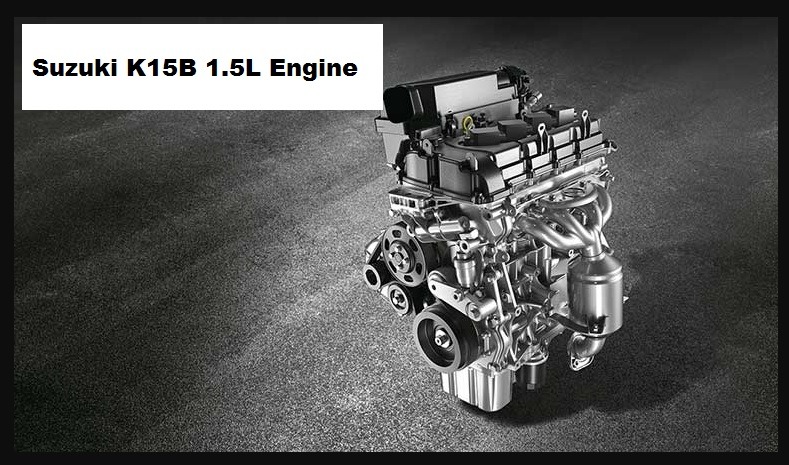Suzuki K15B 1.5L Engine Specs, Problems & Reliability
Suzuki K15B 1.5L Engine
Here in this post, I have gathered information about the Suzuki K15B 1.5L Engine from its official website, including its specifications, Problems, and Reliability.
We believe in providing reliable information to our readers, therefore we prefer to obtain information on the Suzuki K15B 1.5L Engine from authentic sources.
This article, which has been updated, has all the information you require about the Suzuki K15B 1.5L Engine.

The K15B debuted in 2018, and it is a 1.5-litre inline 4-cylinder gasoline engine with natural aspiration.
The K15B is the largest of Suzuki’s inline-four engines. Popular Suzuki vehicles, including the fourth-generation Suzuki Jimny (Sierra/Global), the Suzuki Ciaz, and the Suzuki Ertiga, a compact MPV with room for seven people, all include the 1.5L engine as standard equipment.
The previous small-displacement engine series, which included the M13A and M15A, was discontinued in favour of the new engine.
All of the moving parts in the K15B are made of aluminium. The cylinder block is made of aluminium and features cast-in cylinder liners.
Within the block, the crankshaft is installed at an angle relative to the cylinders. Lightweight pistons with low-tension rings and split-type connecting rods are used in the motor.
Cylinder heads made of aluminium alloy with four valves per cylinder and twin overhead camshafts sit above the engine block.
The timing chain used in the engine is both sturdy and durable; it is also silent, which helps reduce the engine’s overall level of noise, vibration, and harshness.
The camshafts for both the intake and the exhaust are equipped with variable valve timing (VVT).
Camshafts drive bucket hydraulic lifters to open and close the valves. There’s a plastic valve cover on there.
|
Configuration |
Inline
|
|
Number of cylinders
|
4 |
|
Valves per cylinder
|
4
|
|
Valvetrain layout
|
DOHC |
|
Bore, mm
|
74.0 mm (2.90 in)
|
|
Displacement, cc
|
1,462 cc (89 cu in)
|
|
Type of internal combustion engine
|
Four-stroke, naturally aspirated
|
| Manufacturer |
Suzuki Motor Corporation
|
|
Production years
|
2018-present
|
|
Cylinder block material
|
Aluminium
|
|
Cylinder head material
|
Aluminium
|
|
Fuel type
|
Gasoline
|
|
Fuel system
|
Multi-point fuel injection
|
|
Compression Ratio
|
10.0:1
10.5:1 |
|
Power, hp
|
102-105 hp (75-77 kW)/ 6,000
|
|
Torque, lb ft
|
96-102 ft-lb (130-138 Nm)/4,000-4,400
|
|
Firing order
|
1-3-4-2
|
|
Engine oil weight
|
SAE 0W-16
|
|
Engine oil capacity, liter
|
3.6 l (3.8 qt) with oil filter – Suzuki Jimny
|
|
Oil change interval, mile
|
6,000 (10,000 km)/12 months
|
Suzuki K15B 1.5L Engine Problems
It is too soon to speak about frequent issues with the new 1.5L K-series engine, as it has only recently entered the market.
New owners have noted greater oil consumption from the get-go, which is likely par for the course with this particular motor.
Not only that, but the modern injectors used to improve atomization are sensitive to the quality of the fuel, even though conventional fuel injection is still used.
Suzuki K15B 1.5L Engine Review
Maruti Suzuki introduced the Suzuki K15B 1,5L engine in 2018. It is a four-cylinder, naturally aspirated petrol engine. The K15B 1.5L engine is the largest in the K-Series and can be found in a wide range of Maruti Suzuki vehicles, including the Ciaz and Ertiga. For a full review, please check this YouTube video Here.
Suzuki K15B 1.5L Engine FAQ
What is engine type K15B?
The K15B, released by Maruti Suzuki in 2018, is a 1.5-litre, four-cylinder, naturally aspirated gasoline engine.
What is K15B smart hybrid engine?
The Ciaz’s K15 petrol engine was developed to increase its power and torque for better performance on the road.
Next-generation smart hybrid technology, like that found in the Ciaz, makes use of “brake energy regeneration” to put the power it generates to good use by facilitating the engine’s idle start/stop and torque assist operations.
What is Suzuki K Series engine?
Suzuki’s K engine family, which debuted in 1994, consists of inline-3 and inline-4 cylinder aluminium automobile motors.
Displacement can be anything between 0.7 and 1.5 litres.